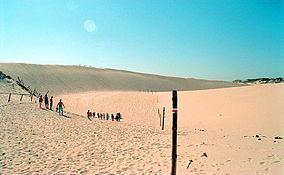Słowiński National Park
| Słowiński National Park | |
|---|---|
|
IUCN category II (national park)
|
|

Moving dunes
|
|
| Location | Pomeranian Voivodeship, Poland |
| Coordinates | 54°42′12″N 17°18′25″E / 54.70333°N 17.30694°ECoordinates: 54°42′12″N 17°18′25″E / 54.70333°N 17.30694°E |
| Area | 186.18 km² |
| Established | 1967 |
| Governing body | Ministry of the Environment |
Słowiński National Park (Polish: Słowiński Park Narodowy) is a national park in Pomeranian Voivodeship, northern Poland. It is situated on the Baltic coast, between Łeba and Rowy. The northern boundary of the park consists of 32.5 kilometres (20.2 mi) of coastline.
The original idea of creating a preserve here came out in 1946, at a conference in Łeba with scientists from Poznań and Gdańsk. The park, however, was created 21 years later, in 1967, on an area of 180.69 km2 (69.76 sq mi). Today it is slightly larger, covering 186.18 km2 (71.88 sq mi), of which 102.13 km2 (39.43 sq mi) consists of waters and 45.99 km2 (17.76 sq mi) of forests. The strictly preserved zone covers 56.19 km2 (21.70 sq mi). In 1977 UNESCO designated the park a biosphere reserve under its Programme on Man and the Biosphere (MaB). The Słowiński wetlands were designated a Ramsar site in 1995.
The park is named after the Slavic (later Germanized) people known as the Slovincians (Polish: Słowińcy), who used to live in this swampy, inaccessible area at the edge of Lake Leba. In the village of Kluki there is an open-air museum presenting aspects of this people's former life and culture.
In the past, the park's area was a Baltic Sea bay. The sea's activity, however, created sand dunes which in the course of time separated the bay from the Baltic Sea. As waves and wind carry sand inland the dunes slowly move, at a speed of 3 to 10 metres per year. Some dunes are quite high - up to 30 metres. The highest peak of the park – Rowokol (115 metres (377 ft) above sea level) – is also an excellent observation point. The "moving dunes" are regarded as a curiosity of nature on a European scale.
...
Wikipedia
